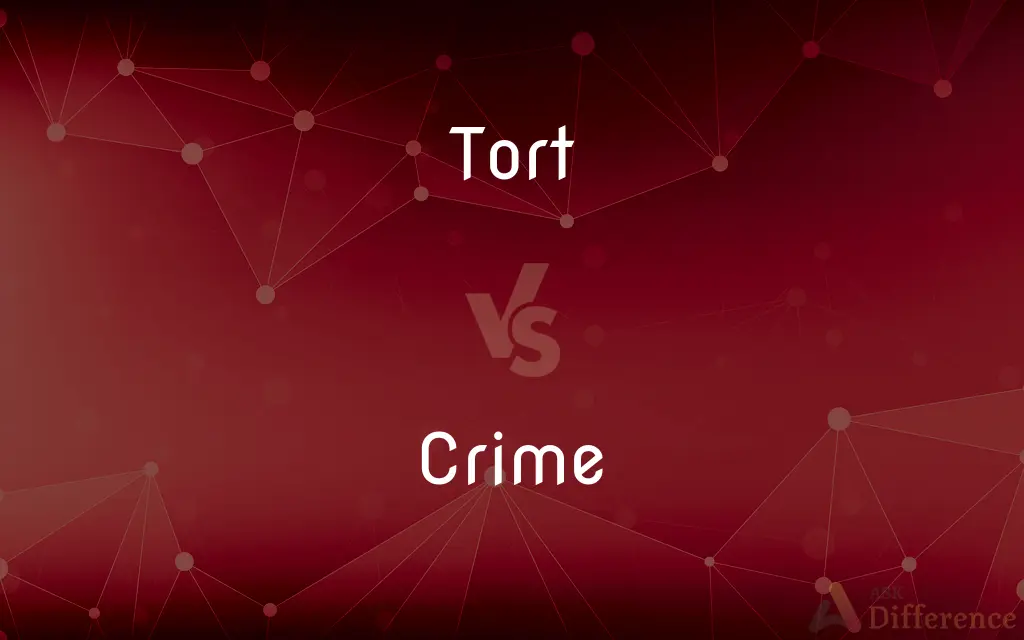Tort vs. Crime — What's the Difference?
By Fiza Rafique & Maham Liaqat — Updated on April 18, 2024
Tort involves civil wrongs causing personal harm or loss, leading to compensation, while crime encompasses offenses against the state, punishable by fines or imprisonment.

Difference Between Tort and Crime
Table of Contents
ADVERTISEMENT
Key Differences
Tort is a legal violation where one party causes harm or loss to another, typically resolved in civil courts. Whereas, crime involves actions that violate laws established by government statutes, and is handled in criminal courts.
Torts are usually committed by negligence, intentional actions, or strict liability, without necessarily breaking a law. On the other hand, crimes require a clear breach of statutory obligations intended to protect public safety and order.
Victims in tort cases seek compensation for damages through private lawsuits. Conversely, in criminal cases, the state prosecutes the offender, seeking penalties such as imprisonment, fines, or community service.
The intention behind pursuing a tort case is primarily to restore the victim to the position they were in before the harm. Whereas, the purpose of criminal prosecution is to punish the wrongdoer and deter future offenses.
Tort law emphasizes restitution, requiring the perpetrator to compensate the victim directly. On the other hand, criminal law focuses on penalizing the wrongdoer, with less direct benefit to the victim, sometimes through indirect restitution.
ADVERTISEMENT
Comparison Chart
Definition
Civil wrong causing personal harm or loss.
Offense against state laws.
Court
Civil courts.
Criminal courts.
Key Elements
Negligence, intent, strict liability.
Violation of statutory laws.
Primary Goal
Compensation to the victim.
Punishment and deterrence.
Beneficiary of Ruling
Direct compensation to victim.
Benefit to public order; indirect to victim.
Compare with Definitions
Tort
Intentional tort.
Alex's act of breaking Mia's phone on purpose is considered an intentional tort.
Crime
Felony.
Armed robbery is classified as a felony due to its severity.
Tort
Compensation.
Sara sued for compensation after her neighbor's dog damaged her garden.
Crime
Misdemeanor.
Jay was charged with a misdemeanor for public intoxication.
Tort
Strict liability.
A company held liable for harm caused by its defective products commits a strict liability tort.
Crime
Deterrence.
Harsh penalties for drunk driving are meant to deter the public from committing the crime.
Tort
Civil wrong.
John's reckless driving causing a car accident is a tort due to negligence.
Crime
Statutory violation.
Stealing from a store is a crime as it violates theft laws.
Tort
Negligence.
Leaving a wet floor unmarked could result in a tort claim if someone slips and falls.
Crime
Punishment.
The court sentenced the offender to three years in prison.
Tort
A tort, in common law jurisdiction, is a civil wrong (other than breach of contract) that causes a claimant to suffer loss or harm, resulting in legal liability for the person who commits the tortious act. It can include intentional infliction of emotional distress, negligence, financial losses, injuries, invasion of privacy, and many other things.
Crime
In ordinary language, a crime is an unlawful act punishable by a state or other authority. The term crime does not, in modern criminal law, have any simple and universally accepted definition, though statutory definitions have been provided for certain purposes.
Tort
A wrongful act or an infringement of a right (other than under contract) leading to legal liability
The law of tort
Public nuisance is a crime as well as a tort
Crime
An act committed in violation of law where the consequence of conviction by a court is punishment, especially where the punishment is a serious one such as imprisonment.
Tort
A wrong that is committed by someone who is legally obligated to provide a certain amount of carefulness in behavior to another and that causes injury to that person, who may seek compensation in a civil suit for damages.
Crime
Unlawful activity
Statistics relating to violent crime.
Tort
(law) A wrongful act, whether intentional or negligent, regarded as non-criminal and unrelated to a contract, which causes an injury and can be remedied in civil court, usually through the awarding of damages.
Crime
A serious offense, especially one in violation of morality.
Tort
(obsolete) An injury or wrong.
Crime
An unjust, senseless, or disgraceful act or condition
It's a crime to waste all that paper.
Tort
(slang) tortoise
Crime
(countable) A specific act committed in violation of the law.
Tort
(slang) tortoiseshell; a tortie.
Crime
(countable) Any great sin or wickedness; iniquity.
Tort
(obsolete) Twisted.
Crime
That which occasions crime.
Tort
Synonym of tart}} {{gloss
Crime
(uncountable) Criminal acts collectively.
Tort
Synonym of taut
Crime
(uncountable) The habit or practice of committing crimes.
Crime doesn’t pay.
Tort
(nautical) Of a boat: watertight.
Crime
To subject to disciplinary punishment.
Tort
Mischief; injury; calamity.
That had them long opprest with tort.
Crime
(nonce word) To commit crime.
Tort
Any civil wrong or injury; a wrongful act (not involving a breach of contract) for which an action will lie; a form of action, in some parts of the United States, for a wrong or injury.
Crime
Any violation of law, either divine or human; an omission of a duty commanded, or the commission of an act forbidden by law.
Tort
Stretched tight; taut.
Yet holds he them with tortest rein.
Crime
Gross violation of human law, in distinction from a misdemeanor or trespass, or other slight offense. Hence, also, any aggravated offense against morality or the public welfare; any outrage or great wrong.
Tort
(law) any wrongdoing for which an action for damages may be brought
Crime
Any great wickedness or sin; iniquity.
No crime was thine, if 'tis no crime to love.
Crime
That which occasion crime.
The tree of life, the crime of our first father's fall.
Crime
(criminal law) an act punishable by law; usually considered an evil act;
A long record of crimes
Crime
An evil act not necessarily punishable by law;
Crimes of the heart
Common Curiosities
Can the same act be both a tort and a crime?
Yes, certain actions like assault can be prosecuted as crimes and also lead to civil tort claims for damages.
What is the standard of proof required in tort vs. crime cases?
Tort cases require proof by a preponderance of evidence, whereas criminal cases require proof beyond a reasonable doubt.
What are the potential consequences of committing a crime?
Consequences include imprisonment, fines, probation, or community service.
Can a victim receive compensation in criminal proceedings?
In some cases, courts may order restitution to the victim, but it is less direct than in civil tort cases.
Who initiates legal proceedings in tort and criminal cases?
Tort cases are initiated by the victim; criminal cases are prosecuted by the state.
What is an example of a strict liability tort?
Manufacturing and selling a defective product that causes injury, regardless of negligence, is a strict liability tort.
How does intent affect tort and criminal cases?
Intent is crucial in certain torts and most crimes; however, torts can also arise from negligence or strict liability.
How do punishments differ between tort and crime?
Tort punishments are financial compensations, while criminal punishments can include incarceration.
What differentiates a tort from a crime?
A tort is a civil wrong seeking compensation, while a crime is a statutory offense seeking to impose penalties.
Are there different types of torts?
Yes, there are three main types: negligence, intentional torts, and strict liability torts.
What role does government play in tort vs. crime?
The government prosecutes crimes to maintain public order, whereas torts are usually between private parties.
Can ignorance of the law excuse someone from a tort or crime?
Ignorance of law typically does not excuse crimes and rarely excuses torts.
Share Your Discovery

Previous Comparison
Permittivity vs. Permeability
Next Comparison
Picture vs. PlanAuthor Spotlight
Written by
Fiza RafiqueFiza Rafique is a skilled content writer at AskDifference.com, where she meticulously refines and enhances written pieces. Drawing from her vast editorial expertise, Fiza ensures clarity, accuracy, and precision in every article. Passionate about language, she continually seeks to elevate the quality of content for readers worldwide.
Co-written by
Maham Liaqat















































